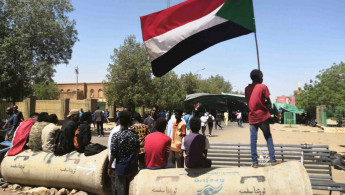Sudanese forces 'led by deputy leader' attempt to disperse mass sit-in
Thousands of protesters have been gathered outside the military headquarters day and night since 6 April, prompting the army to seize power from President Omar al-Bashir in a coup last week.
The military and the Rapid Support Forces (RSF) did not use force in their attempt to disperse the sit-in and no one was hurt, but the incident inflamed concerns that the military - now Sudan's official leaders in charge of a transitional council - will go back on its promises not to use force against peaceful demonstrators.
"There is an attempt to disperse the sit-in in front of the Army General Command and remove all of the roadblocks now," leading protest organisers the Sudanese Professionals Association (SPA) announced in a statement on Monday morning.
"We ask everyone to go immediately to the sit-in to protect your revolution and successes."
The SPA, which is also a key constituent of the Alliance for Freedom and Change now negotiating with the transitional military council, made statements later in the morning and afternoon saying that the "attempts to break up the sit-in" were ongoing.
The RSF surrounded the sit-in on Monday morning, reported Channel 4 journalist Yousra Elbagir. They were accompanied by Sudanese army bulldozers.
"The border guard militia, along with some troops from the army, have asked people to help them with clearing the roads blocks, saying 'let's help each other'," she tweeted.
"Now the people are chanting to them, 'clean the keizan (Islamist regime men), and we'll clean the area.'"
She added that the RSF troops retreated but did not leave the area.
Read more: 'A portal into tomorrow's Sudan': Inside the sit-in that brought down Sudan's dictator Bashir
"In their conversations with the protesters, the forces told them that the purpose of the entry of the bulldozers was cleanliness. This step is unjustified, as the protesters organise ongoing campaigns for cleanliness themselves," Yasser Ali, one of the protesters, told The New Arab's Arabic service.
"The only explanation unanimously agreed upon by the protesters is that what happened was an attempt to rush in on the protesters and disperse them."
|
|
Attempts to break up the sit-in before Bashir was overthrown results in the deaths of dozens of people.
The RSF is commanded by the current deputy leader of Sudan’s transitional military council, Mohammad Hamdan Daglo, also known as Himeidti.
A day before Bashir was overthrown by the military, Himeidti called on the RSF to protect protesters rather than attack them.
While some Sudanese have accepted this as evidence of the military commander siding with the protesters, most have roundly rejected Himeidti’s new role as second-in-command of the country.
"I think its a well-played game," Sara, a Sudanese architect present at the sit-in on Monday told The New Arab.
"Hemeidti is a criminal and he always will be. He lead the Janjaweed forces in committing war crimes in Darfur. No one trusts them and no one ever will."
The paramilitary anti-insurgency force is one of several forces descending from the Janjaweed militias of the Darfur conflict.
The Sudanese regime is alleged to have recruited, funded and armed the Janjaweed who committed mass rape, murder, war crimes and genocide in West Darfur and other regions, according to the International Criminal Court (ICC).
Under Himedti, the RSF has fought against rebel groups in the conflict areas of Darfur, Blue Nile and South Kordofan, but it has also been accused of crimes and human rights violations against civilians in those areas.
The RSF has also been responsible for rounding up and deporting refugees and migrants, most of whom are Somalis, Eritreans and Ethiopians, attempting to cross the desert to reach Europe.
Many protesters see Himeidti's position as deputy leader of the council as evidence that the military does not intend to seriously reform the Sudanese regime.
"Now everyone is afraid of him because he has a faction of forces with around 500,000 troops," a Sudanese protester who did not wish to be named told The New Arab.
"His proximity to the Saudi and Emirati governments is also very worrying… Himeidti's ambition now is power."





 Follow the Middle East's top stories in English at The New Arab on Google News
Follow the Middle East's top stories in English at The New Arab on Google News
![Israeli forces ordered bombed Gaza's Jabalia, ordering residents to leave [Getty]](/sites/default/files/styles/image_330x185/public/2176418030.jpeg?h=a5f2f23a&itok=_YGZaP1z)

